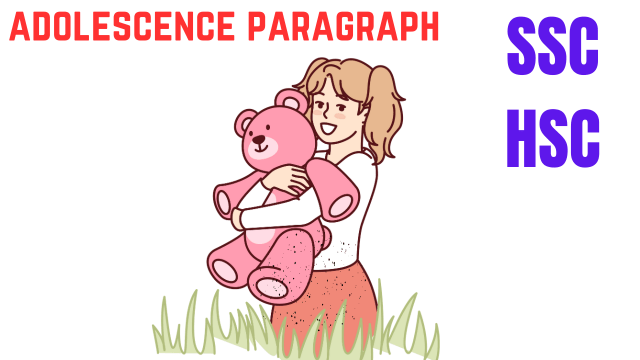adolescence paragraph 8-10, SSC, HSC and all students 100-500 words. Go through the below written paragraph carefully, hope you will be able to appear in any exam by reading it.
Adolescence paragraph 120 keywords
Adolescence is a significant development phase marked by rapid physical, cognitive, and emotional changes. It is a time of transition from childhood to adulthood, where individuals navigate the complexities of identity formation, social relationships, and increased independence. During this period, teenagers may experience heightened self-awareness, exploration of personal values, and discovering their unique interests and talents. While adolescence can present challenges, it is also an excellent opportunity for personal growth and self-discovery. By providing support and guidance and fostering a nurturing environment, we can empower adolescents to navigate this transformative journey and emerge as confident and capable adults.
Adolescence paragraph 200 keywords
Adolescence is a crucial human development stage characterized by significant physical, emotional, and social changes. It is a time of self-discovery, where young individuals explore their identities, form meaningful relationships, and begin to shape their futures. This transitional period can be exciting and challenging as teenagers navigate the complexities of peer pressure, academic expectations, and personal growth. Parents, educators, and society must provide support, guidance, and a safe space for adolescents to express themselves and develop a strong sense of self. By understanding the unique needs of teenagers during this transformative phase, we can empower them to embrace their potential, cultivate resilience, and embark on a path of personal growth and fulfilment.
Adolescence paragraph 350 keywords
Adolescence is a significant period of development that marks the transition from childhood to adulthood. It is a time of profound physical, cognitive, and emotional changes as individuals navigate the complexities of self-discovery, identity formation, and social relationships. During adolescence, teenagers undergo rapid growth spurts, experience hormonal shifts, and develop cognitive abilities that enable them to think abstractly and critically. In this transformative phase, adolescents seek independence and autonomy while balancing the influence of peers, family, and societal expectations. They explore their unique interests, values, and talents, often testing boundaries and pushing limits as they shape their identities. It is also a time when emotional intensity and self-awareness increase as young individuals grapple with complex emotions and develop their perspectives on the world. Navigating adolescence can be challenging, both for the teenagers themselves and for their parents and caregivers. It requires a delicate balance of support, guidance, and understanding. Providing a nurturing environment that encourages open communication, active listening, and empathy is crucial during this phase. Adolescents need a safe space to express themselves freely, ask questions, and receive guidance without judgment. Education plays a vital role in adolescence, not only in terms of academic development but also in fostering social and emotional growth. Schools and educators should create inclusive environments that promote personal growth, self-confidence, and resilience. Offering opportunities for extracurricular activities, creative expression, and peer interactions can further enhance the overall development of adolescents. Society as a whole needs to recognize and respect the unique challenges faced by adolescents. By promoting mental health awareness, advocating for positive body image, and combating stereotypes, we can create a supportive environment that nurtures the growth and well-being of teenagers. Emphasizing the importance of healthy relationships, self-care, and responsible decision-making equips adolescents with the tools they need to navigate this transformative period successfully. In conclusion, adolescence is a remarkable journey of growth and self-discovery. It is a time of immense change, challenges, and opportunities. By providing the necessary support, guidance, and understanding, we can empower adolescents to embrace their individuality, cultivate their strengths, and confidently navigate this transformative phase. Together, let us foster an environment that nurtures the growth and potential of every adolescent, allowing them to thrive and flourish as they transition into adulthood.
See More:
Frequently Asked Questions (FAQ) – Adolescence
What is adolescence?
Adolescence is a developmental stage between childhood and adulthood, typically during the teenage years. Physical, cognitive, and emotional changes and a search for personal identity characterize it.
What are the physical changes that occur during adolescence?
During adolescence, individuals experience significant physical changes, including growth spurts, hormonal fluctuations, and secondary sexual Characteristics such as the maturation of breasts in girls and the emergence of facial hair growth in boys.
What are some common emotional challenges faced by adolescents?
Adolescents often experience emotional challenges, such as mood swings, heightened self-consciousness, and a desire for independence. They may also grapple with issues like peer pressure, self-esteem, and navigating romantic relationships.
How does adolescence impact social relationships?
Adolescence is a time when social relationships become increasingly important. Teenagers may seek to establish their identity separate from their family, form close friendships, and explore romantic relationships. They may also experience conflicts with peers or parents as they navigate these new dynamics.
What role do parents and caregivers play during adolescence?
Parents and caregivers play a crucial role in supporting adolescents during this stage. Maintaining open communication, providing guidance, setting boundaries, and offering emotional support are essential. Creating a safe and nurturing environment helps teenagers navigate the challenges they face.
Are there mental health concerns associated with adolescence?
Yes, adolescence can be a vulnerable period for mental health. Common mental health concerns include depression, anxiety, eating disorders, and substance abuse. Recognizing the signs of mental health issues and seeking appropriate support and professional help when needed is essential.
How can schools support adolescents during this stage?
Schools can support adolescents by providing a positive and inclusive environment. This includes offering comprehensive education on mental health, healthy relationships, and personal development. Schools can also provide access to counselling services and extracurricular activities that promote growth and self-expression.
What can society do to support adolescents?
Society can support adolescents by creating awareness about their challenges and promoting empathy and understanding. This includes challenging stereotypes, addressing issues like bullying and body image, and advocating for policies and programs that prioritize the well-being and development of young individuals.
Remember, adolescence is a unique and transformative stage of life. Each individual’s experience may differ, and it is essential to approach it with patience, understanding, and support. Providing a nurturing environment and resources can help adolescents navigate this critical phase and emerge as resilient and confident adults.

Related searches:
adolescence paragraph for hsc with bangla meaning
adolescence challenge in bangladesh paragraph
adolescence paragraph 300 words
adolescence paragraph for hsc 2023
adolescence paragraph for class 8
adolescence paragraph for admission
adolescence paragraph for class 6
short paragraph on adolescence
adolescence paragraph with bangla meaning
adolescence paragraph for ssc
GPS location tracker: See NOW

